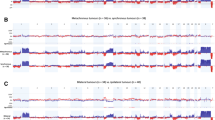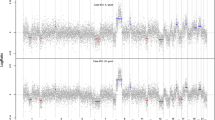Abstract
Clonality of multicentric breast cancer has traditionally been difficult to assess. We aimed to assess this using analysis of TP53 status (expression and mutation status). These results were then incorporated into an analysis of prognostic factors in multicentric tumours in a 10-year follow up study. Clonal status of multicentric breast cancer foci (n = 88 foci) was determined by immunohistochemical and molecular studies of TP53 in a total of 40 patients. Prognostic factors from these patients were also compared with 80 age- and stage-matched controls with unicentric breast cancer from the Royal Marsden NHS Foundation Trust Breast Cancer Database. Our results indicate that multicentric breast cancer foci were polyclonal within an individual patient in at least 10 patients (25%) with respect to immunohistochemical staining and in four patients (10%) with respect to abnormal band shifts on single strand conformational polymorphism (SSCP) molecular analysis. No individual variable was predictive of multicentric or unicentric disease. However, there was a worse overall survival in the multicentric breast cancer patients in whom at least two cancer foci stained positively on TP53 immunohistochemistry compared with the matched control group (P = 0.04). In conclusion, these results suggest that a proportion of multicentric breast cancer foci are polyclonal with respect to TP53 status and that TP53 over-expression predicts for a poorer prognosis in multicentric breast cancer.


Similar content being viewed by others
Abbreviations
- SSCP:
-
Single strand conformational polymorphism
- DCIS:
-
Ductal carcinoma in situ
- PBS:
-
Phosphate-buffered saline
- PCR:
-
Polymerase chain reaction
- IPTG:
-
Isopropyl-β-d-thiogalactopyranoside
- CDGE:
-
Constant denaturant gel electrophoresis
- CASH:
-
Cancer and steroid hormone study
References
Jiang H, Reinhardt HC, Bartkova J, Tommiska J, Blomqvist C, Nevanlinna H, Bartek J, Yaffe MB, Hemann MT (2009) The combined status of ATM and p53 link tumor development with therapeutic response. Genes Dev 23:1895–1909
Bartek J, Iggo R, Gannon J, Lane DP (1990) Genetic and immunochemical analysis of mutant p53 in human breast cancer cell lines. Oncogene 5:893–899
Vogelstein B, Fearon ER, Hamilton SR, Preisinger AC, Willard HF, Michelson AM, Riggs AD, Orkin S (1987) Clonal analysis using recombinant DNA probes from the X-chromosome. Cancer Res 47:4806–4813
Gilliland DG, Blanchard KL, Levy J, Perrin S, Bunn HF (1991) Clonality in myeloproliferative disorders: analysis by means of the polymerase chain reaction. Proc Natl Acad Sci USA 88:6848–6852
Camargo M, Wang N (1980) Cytogenetic evidence for the absence of an inactivated X chromosome in a human female (XX) breast carcinoma cell line. Hum Genet 55:81–85
Eeles RA, Bartkova J, Lane DP, Bartek J (1993) The role of TP53 in breast cancer development. Cancer Surv 18:57–75
Done SJ, Arneson NCR, Ozcelik H, Redston M, Andrulis IL (1998) p53 Mutations in mammary ductal carcinoma in situ but not in epithelial hyperplasias. Cancer Res 58:785–789
Lagios MD (1997) Multicentricity of breast carcinoma demonstrated by routine correlated serial subgross and radiographic examination. Cancer 40:1726–1734
Cannon-Albright LA, Thomas A, Goldgar DE, Gholami K, Rowe K, Jacobsen M, McWhorter WP, Skolnick MH (1994) Familiality of cancer in Utah. Cancer Res 54:2378–2385
Kurtz JM, Jacquemier J, Amalric R, Brandone H, Ayme Y, Hans D, Bressac C, Spitalier JM (1990) Breast-conserving therapy for macroscopically multiple cancers. Ann Surg 212:38–44
Eyfjord JE, Thorlacius S, Steinarsdottir M, Valgardsdottir R, Ogmundsdottir HM, Anamthawat-Jonsson K (1995) p53 abnormalities and genomic instability in primary human breast carcinomas. Cancer Res 55:646–651
Egan RL (1982) Multicentric breast carcinomas: clinical-radiographic-pathologic whole organ studies and 10-year survival. Cancer 49:1123–1130
Bartek J, Bartkova J, Vojtesek B, Staskova Z, Lukas J, Rejithar J, Kovarik J, Midgley CA, Gannon JV, Lane DP (1991) Aberrant expression of the TP53 oncoprotein is a common feature of a wide spectrum of human malignancies. Oncogene 6:1699–1703
Vojtesek B, Bartek J, Midgley CA, Lane DP (1992) An immunochemical analysis of human p53: new monoclonal antibodies and epitope mapping using recombinant p53. J Immunol Methods 151:237–244
Midgley CA, Fisher C, Bartek J, Vojtesek B, Lane DP, Barnes DM (1992) Expression of p53 in bacteria: generation of polyclonal antiserum and analysis of p53 expression in human tumors. J Cell Sci 101:183–189
Goelz SE, Hamilton SR, Vogelstein B (1985) Purification of DNA from formaldehyde fixed and paraffin embedded human tissue. Biochem Biophys Res Commun 130:118–126
Saiki RK, Gelfand DH, Stoffel S, Scharf SJ, Higuchi R, Horn GT, Mullis KB, Erlich HA (1998) Primer-directed enzymatic amplification of DNA with a thermostable DNA polymerase. Science 239:487–491
Dubeau L, Chandler LA, Gralow JR, Nichols PW, Jones PA (1986) Southern blot analysis of DNA extracted from formalin-fixed pathology specimens. Cancer Res 46:2964–2969
Orita M, Iwahana H, Kanazawa H, Hayashi K, Sekiya T (1989) Detection of polymorphisms of human DNA by gel electrophoresis as single-strand conformation polymorphisms. Proc Natl Acad Sci USA 86:2766–2770
Eeles RA (2000) Germline and somatic mutations in the TP53 gene in breast and other cancers. PhD Thesis, University of London, UK
Sambrook J, Fritsch EF, Maniatis T (1989) Molecular cloning: a laboratory manual, 2nd edn. Cold Spring Harbor Laboratory Press, NY, USA
Sanger F, Nicklen S, Coulson AR (1997) DNA sequencing with chain-terminating inhibitors. Proc Natl Acad Sci USA 74:5463–5467
Wood WI, Gitscher J, Lasky LA, Lawn RM (1985) Base composition-independent hybridisation in tertramethylammonium chloride: a method for oligonucleotide screening of highly complex gene libraries. Proc Natl Acad Sci USA 82:1585–1588
Stratton MR, Moss S, Warren W, Patterson H, Clark J, Fisher C, Fletcher CD, Ball A, Thomas M, Gusterson BA (1990) Mutation of the p53 gene in human soft tissue sarcomas: association with abnormalities of the RB1 gene. Oncogene 5:1297–1301
Cox DR (1972) Regression models and life tables (with discussion). J R Stat Soc Ser B 34:187–220
Runnebaum IB, Nagarajan M, Bowman M, Soto D, Sukumar S (1991) Mutations in p53 as potential molecular markers for human breast cancer. Proc Natl Acad Sci USA 88:10657–10661
Mazars R, Spinardi L, BenCheikh M, Simony-Lafontaine J, Jeanteur P, Theillet C (1992) p53 mutations occur in aggressive breast cancer. Cancer Res 52:3918–3923
Kovach JS, McGovern RM, Cassady JD, Swanson SK, Wold LE, Vogelstein B, Sommer SS (1991) Direct sequencing from touch preparations of human carcinomas: analysis of p53 mutations in breast carcinomas. J Natl Cancer Inst 83:1004–1009
Coles C, Condie A, Chetty U, Steel CM, Evans HJ, Prosser J (1992) TP53 mutations in breast cancer. Cancer Res 52:5291–5298
Thompson AM, Anderson TJ, Condie A, Prosser J, Chetty U, Carter DC, Evans HJ, Steel CM (1992) p53 allele losses, mutations and expression in breast cancer and their relationship to clinico-pathological parameters. Int J Cancer 50:528–532
Jacquemier J, Moles JP, Penault-Llorca F, Adelaide J, Torrente M, Viens P, Birnbaum D, Theillet C (1994) TP53 immunohistochemical analysis in breast cancer with four monoclonal antibodies: comparison of staining and PCR-SSCP results. Br J Cancer 69:846–852
Gretarsdottir S, Trygyadottir L, Jonasson JG, Sigurdsson H, Olafsdottir K, Agnarsson BA, Ogmundsdottir H, Eyfjord J (1996) TP53 mutation analysis on breast carcinomas: a study of paraffin-embedded archival material. Br J Cancer 74:555–561
Bartkova J, Horejsi Z, Koed K, Kramer A, Tort F, Zieger K, Guldberg P, Sehested M, Nesland JM, Lukas C, Orntoft T, Lukas J, Bartek J (2005) DNA damage response as a candidate anti-cancer barrier in early human tumorigenesis. Nature 434:864–870
Hartmann A, Blaszyk H, McGovern RM, Schroeder JJ, Cunningham J, De Vries EM, Kovach JS, Sommer SS (1995) p53 gene mutations inside and outside of exons 5–8: the patterns differ in breast and other cancers. Oncogene 10:681–688
Sjogren S, Inganas M, Norberg T, Lindgren A, Nordgren H, Holmberg L, Bergh J (1996) The p53 gene in breast cancer: prognostic value of complementary DNA sequencing versus immunohistochemistry. J Natl Cancer Inst 88:173–182
Noguchi S, Motomura K, Inaji H, Imaoka S, Koyama H (1992) Clonal analysis of human breast cancer by means of the polymerase chain reaction. Cancer Res 52:6594–6597
Middleton LP, Vlastos G, Mirza NQ, Singletary SE, Sahin AA (2002) Multicentric mammary carcinoma. Cancer 94:1910–1916
Vlastos G, Rubio IT, Mirza NQ, Newman LA, Aurora R, Alderfer J, Buzdar AU, Singletary SE (2000) Impact of multicentricity on clinical outcome in patients with T1–2, N0–1, M0 Breast cancer. Ann Surg Oncol 7(8):581–587
Eckert KA, Kunkel TA (1991) The fidelity of DNA polymerases used in the polymerase chain reactions. In: McPherson MJ, Quirke P, Taylor GR (eds) PCR: a practical approach. Oxford University Press, New York, pp 225–245
Claus EB, Risch N, Thompson WD (1991) Genetic analysis of breast cancer in the cancer and steroid hormone study. Am J Hum Genet 48:232
Yeruchalmi R, Kennecke H, Woods R, Olivotto IA, Speers C, Gelmon KA (2009) Does multicentric/multifocal breast cancer differ from unifocal breast cancer? An analysis of survival and contralateral breast cancer incidence. Breast Cancer Res Treat 117:365–370
Acknowledgments
The authors are grateful to the late Prof J Sloane and Mr U Querci della Rovere and Dr M Kershaw for pathology expertise and referrals respectively, Dr I McGrath for referrals. We are grateful to Mrs Sue Clinton and Ms Liz Philp for cutting the sections. The authors would like to thank Dr A Nash for referrals and Professor Sir David Lane for kind donation of the TP53 antibodies. This work was supported by The Royal Marsden NHS Foundation Trust, The Institute of Cancer Research, The Mayday University Hospital and The European Commission (Projects ‘Active p53’, ‘Infla-Care’ and ‘Biomedreg-CZ.1.05/2.1.00/01.0030’ to Prof Bartek). The authors would like to thank Elizabeth Page for her assistance with formatting the paper for submission. We acknowledge support of The NIHR to The Biomedical Research Centre at The Institute of Cancer Research and Royal Marsden NHS Foundation Trust.
Conflict of interest
Prof Eeles has received educational grants from Astra Zeneca and Tepnel (now GenProbe).
Author information
Authors and Affiliations
Corresponding author
Additional information
Bartek J, Yarnold J—joint senior authors.
Rights and permissions
About this article
Cite this article
Eeles, R., Knee, G., Jhavar, S. et al. Multicentric breast cancer: clonality and prognostic studies. Breast Cancer Res Treat 129, 703–716 (2011). https://doi.org/10.1007/s10549-010-1230-3
Received:
Accepted:
Published:
Issue Date:
DOI: https://doi.org/10.1007/s10549-010-1230-3




